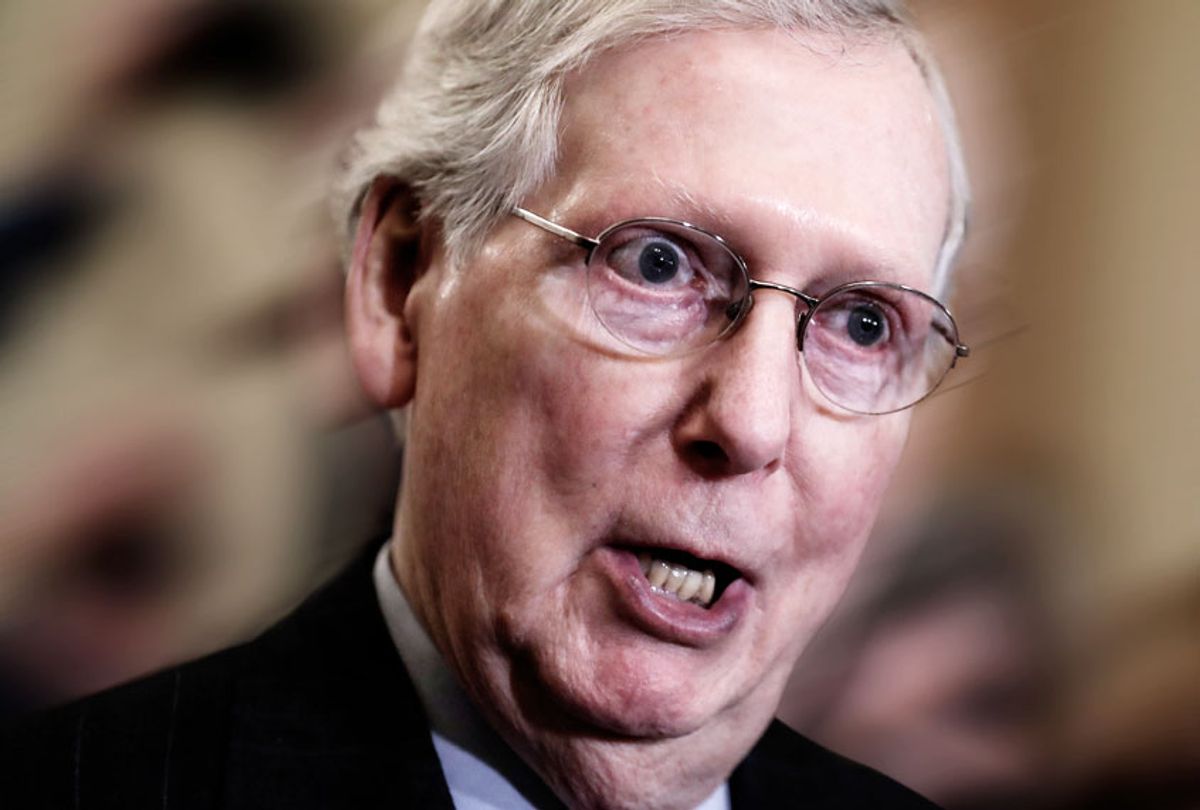Republican lawmakers used the coronavirus relief bill to give millionaires a tax break they failed to include in the 2017 tax cut bill.
The 2017 Republican tax cut imposed restrictions on how much owners of "pass-through" businesses, or companies in which the owner pays an individual income tax on profits rather than the corporate income tax, can deduct against non-business income, such as capital gains. The bill set a $250,000 cap on losses that can be deducted.
But right-wing think tanks and some lawmakers complained about the cap, and Senate Republicans snuck a provision into the coronavirus relief bill last month to suspend the limits, The Washington Post reports.
The Joint Committee on Taxation (JCT), a nonpartisan congressional agency, estimates that more than 80% of the benefits of the tax change will benefit those who earn more than $1 million per year.
The suspension is expected to cost about $90 billion this year alone and is part of a larger set of tax changes expected to add $170 billion to the national deficit over the next decade, according to the JCT.
In all, about 82% of the benefits will go to just about 43,000 taxpayers. Less than 3% of the benefits will flow to those who earn under $100,000 per year. The bill also allows business owners to apply the tax changes retroactively to their 2018 and 2019 losses.
Steve Rosenthal, a tax expert at the nonpartisan think tank the Tax Policy Center, told The Post that hedge fund investors and real estate businesses will be "far and away" the main beneficiaries of the change.
Sen. Sheldon Whitehouse, D-R.I., who requested the JCT analysis, accused Republicans of trying to funnel taxpayer money to millionaires amid a public health crisis.
"It's a scandal for Republicans to loot American taxpayers in the midst of an economic and human tragedy," he said in a statement. "This analysis shows that while Democrats fought for unemployment insurance and small business relief, a top priority of President Trump and his allies in Congress was another massive tax cut for the wealthy. Congress should repeal this rotten, un-American giveaway and use the revenue to help workers battling through this crisis."
Rep. Lloyd Doggett, D-Tex., said the tax break dwarfed the funding needed for critical coronavirus response efforts.
"For those earning $1 million annually, a tax break buried in the recent coronavirus relief legislation is so generous that its total cost is more than total new funding for all hospitals in America and more than the total provided to all state and local governments," he said. "Someone wrongly seized on this health emergency to reward ultra-rich beneficiaries, likely including the Trump family, with a tax loophole not available to middle class families. This net operating loss loophole is a loser that should be repealed."
Republicans argued there was no problem with the provision because the bill — which also included more than $2 trillion in aid to individuals, businesses and hospitals — was passed on an overwhelmingly bipartisan basis.
A spokesman for Senate Finance Chairman Chuck Grassley, R-Iowa, told The Post that the bill "helps businesses keep the lights on and employees on payroll as much as possible to get through this crisis. Every senator criticizing this provision voted for this bipartisan bill, so their complaints about a law they helped write simply stink of partisan politics."
But The Post noted that Republicans used the "must-pass legislation" to "make tax changes they had sought for years," including a payroll tax holiday and tax incentives for companies to retain their employees.
Whitehouse slammed Republicans on Twitter for using the bill to include "completely unrelated $195 billion dollar tax giveaway, almost all for millionaires and billionaires."
"We're trying to make sure hospitals have enough, they're fattening up donors," he added.
Conservatives argued that the tax change would help the coronavirus relief efforts.
"The tax relief gives businesses badly needed liquidity during the coronavirus pandemic while also reducing the tax penalty on risky business investments," Alan Viard of the right-wing American Enterprise Institute wrote.
But Democrats argued that the money would be better spent to help people that aren't millionaires.
"Instead of giving relief to Americans who are struggling to make ends meet, Senate Republicans snuck in tax breaks and corporate giveaways for their wealthy friends," Rep. Barbara Lee, D-Calif., said. "We should be prioritizing the needs of working-class Americans — not millionaires."



Shares